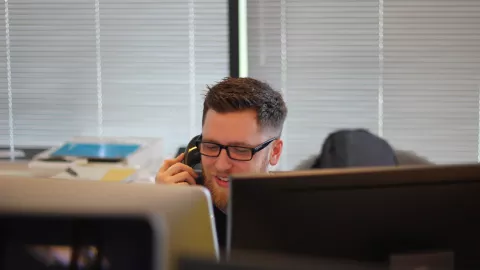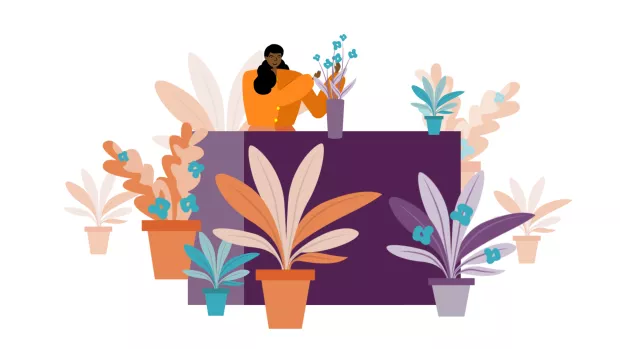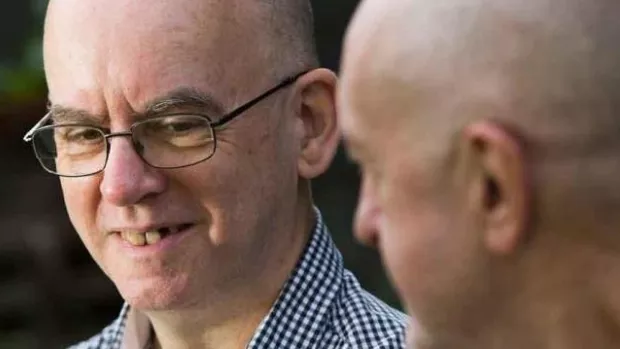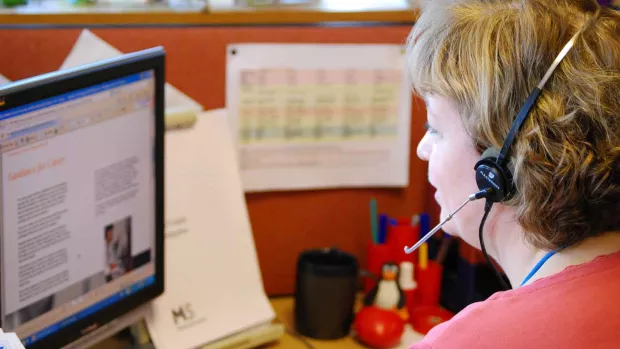
Volunteering for the MS Helpline has been a lifechanger
When I was diagnosed with MS in 1991, there was no internet. I couldn’t google what was going on - I took myself off to the library and looked it up in a book.
I was working as a firefighter, and started to feel clumsy in the lead up to my diagnosis. I had some numbness in my left hand. Then one day when we were out on a call, I needed to hang onto the handrail to get down the stairs. By the end of the week I was having to hold onto everything.
After my diagnosis I transferred from firefighting to fire control. That meant sitting at a desk, wearing headphones and taking 999 calls. I enjoyed the variety of calls but three years later, my fatigue got too much and I was medically retired. I was 31.
Struggling to find a role
Around the same time my marriage broke down. I now know about the stages of grief, and looking back I can see I worked through them all. I was grieving for the plans I had for the future and the life I imagined I would have.
I questioned my own self-worth. As a man living at that time, I felt like I had to be the breadwinner – my role was to earn and put food on the table. And that was taken away from me. I felt that I couldn’t do anything and that I was useless.
I didn’t look for support - I didn’t want anything to do with anyone or any institution to do with MS. It wasn’t on my radar. I was looking inwards. Maybe it was pride.
There was also less support available then, and there wasn’t the knowledge, the treatments and the therapies there are now.
Turning my MS into something positive
On my fortieth birthday I lost it. That was my darkest day. I didn’t want to live and I didn’t want to die. At that point I said to myself: Stuart, this is your life. And I started to accept it. I started looking around for something I could do.
I saw an advert on Twitter for MS Helpline volunteers with the MS Society. It was something I could do at home, and taking calls, using a headset, was all very familiar from my time in fire control. I applied for the role and was accepted.
All of a sudden I felt that there was another star in the sky. I could turn my MS into something positive, and I felt that my life had purpose again. It’s been a lifechanger for me.
Supporting others on their MS journey
I started volunteering in May 2014. I didn’t ‘go live’ on my own until the November. Firstly you listen in on calls, then you start taking them yourself with someone listening in to you. It evolves until I got to the point where I was ready to take calls on my own.
Before my first call I didn’t have any fingernails left! But then I relaxed into it, listening to the caller and taking it from there. With experience, it gets easier. I do two sessions a week for two hours, all working from my home, but with support always at the end of the phone.
I enjoy that I have no idea what’s going to come in. It’s like my job with the fire service in that respect. But most of all, I like the feeling I get when I feel I’ve left a caller in a better place.
Often people can call and start off being a bit quiet, perhaps there are tears. And often by the end of the call there might be some laughter. That’s wonderful.
Asking for help
There’s that expression: ‘getting things off your chest’. I think if we carry things around they can weigh us down. Getting them out into the open can help make things easier. This can be easier said than done, as many of us are quite reserved.
Over my MS journey, I’ve changed and now I’m an open book. I think over the last 30 years society has changed too. We’re allowed to be open and honest with our feelings now, it’s not all about the stiff upper lip. We can say that we’re struggling.
Lots more services on the MS Helpline
Since I started volunteering on the MS Helpline, it’s changed a lot too. There’s now MS nurses, benefits advisors, an MS legal advisor, a physical activity service…it’s great to be able to put callers through to these services, it’s added so much to the helpline.
I’ve learnt so much from volunteering. I’ve had MS for 30 years and I thought everyone with MS was the same as me. I do recognise where a lot of callers are coming from – I’ve been in those headspaces too.
But I’ve also learnt everyone is different. I’ve learnt not to judge.
I don’t tell people what they should do. It’s more about understanding how someone is feeling. A lot of people need to be heard and understood, and that’s enough.




